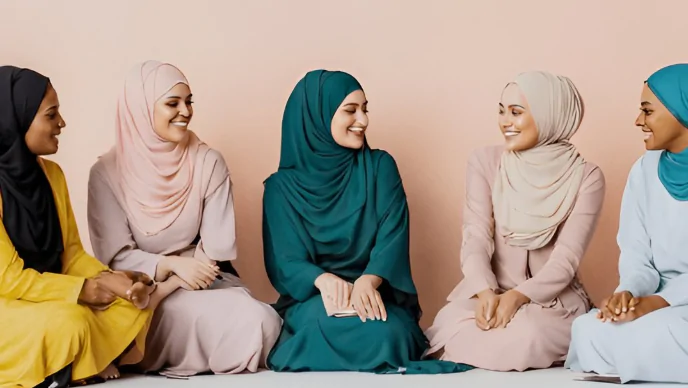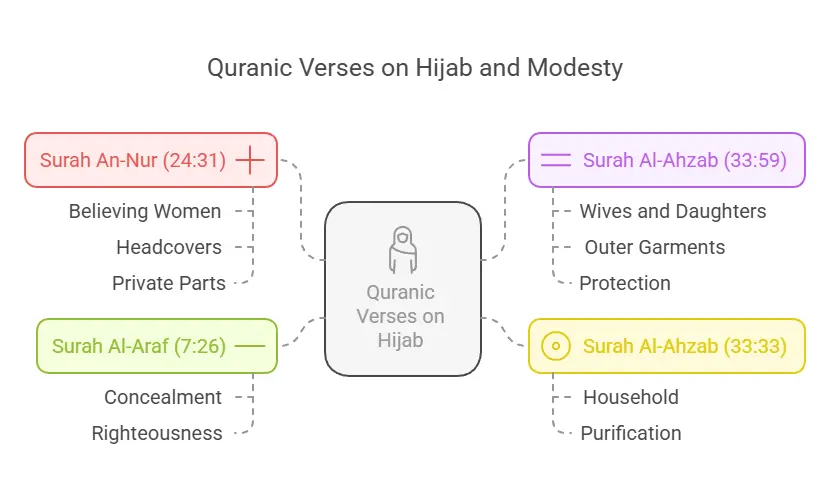
The hijab, a symbol of modesty and faith, holds a profound place in Islam – quran quotes about hijab. Rooted in the teachings of the Quran, the hijab is not merely a piece of clothing but a reflection of a Muslim woman’s commitment to her faith and her relationship with Allah.
In this article, we will explore the Quranic verses that discuss hijab, its spiritual significance, and its role in shaping the identity of Muslim women.
We will also address common misconceptions, the benefits of wearing hijab, and how modern Muslim women are embracing this practice in today’s world.
Whether you are a new hijabi, considering wearing hijab, or simply seeking to understand its importance, this guide will provide you with a comprehensive understanding of hijab as outlined in the Quran.
Quranic Verses About Hijab
The Quran offers specific directives about hijab and highlights its vital role in achieving modesty and dignity while expressing religious commitment.
Four important Quranic verses discuss hijab and reveal their distinct perspectives on its significance.
Surah An-Nur (24:31) – The Primary Verse on Hijab (quran quotes about hijab)
Surah An-Nur (24:31) is often regarded as the primary verse in the Quran that discusses hijab. It states:
“And tell the believing women to reduce [some] of their vision and guard their private parts and not expose their adornment except that which [necessarily] appears thereof and to wrap [a portion of] their headcovers over their chests and not expose their adornment except to their husbands, their fathers, their husbands’ fathers, their sons, their husbands’ sons, their brothers, their brothers’ sons, their sisters’ sons, their women, that which their right hands possess, or those male attendants having no physical desire, or children who are not yet aware of the private aspects of women. And let them not stamp their feet to make known what they conceal of their adornment. And turn to Allah in repentance, all of you, O believers, that you might succeed.”
Surah Al-Ahzab (33:59) – The Command for Modesty
Surah Al-Ahzab (33:59) provides another critical instruction regarding hijab:
“O Prophet, tell your wives and your daughters and the women of the believers to bring down over themselves [part] of their outer garments. That is more suitable that they will be known and not be abused. And ever is Allah Forgiving and Merciful.”
Surah Al-Ahzab (33:33) – Hijab for the Wives of the Prophet
Surah Al-Ahzab (33:33) addresses the wives of the Prophet Muhammad (peace be upon him) specifically:
“And abide in your houses and do not display yourselves as [was] the display of the former times of ignorance. And establish prayer and give zakah and obey Allah and His Messenger. Allah intends only to remove from you the impurity [of sin], O people of the [Prophet’s] household, and to purify you with [extensive] purification.”
Surah Al-Araf (7:26) – The Concept of Clothing as a Means of Taqwa
Surah Al-Araf (7:26) introduces a broader perspective on clothing and modesty:
“O children of Adam, We have bestowed upon you clothing to conceal your private parts and as adornment. But the clothing of righteousness—that is best. That is from the signs of Allah that perhaps they will remember.”
This section examines Quranic verses about hijab in detail to provide a complete understanding of their meanings and implications.
The in-depth analysis of each verse delivers essential takeaways to help readers understand Quranic teachings on modesty.
10 Islamic Quotes and Tteachings related to the Hijab
- Quran 24:31
“And tell the believing women to lower their gaze and guard their chastity, and not to reveal their adornments except what normally appears. Let them draw their veils over their chests, and not reveal their hidden adornments except to their husbands…”
This verse emphasizes the importance of modesty and covering for Muslim women. - Quran 33:59
“O Prophet, tell your wives and daughters and the believing women to draw their outer garments around them. That is more suitable that they will be known and not be abused. And ever is Allah Forgiving and Merciful.”
This verse highlights the hijab as a means of protection and dignity. - Hadith (Abu Dawood)
“A woman is closest to Allah when she is in the privacy of her home, and she is closest to Allah when she is in the depths of her hijab.”
This hadith reflects the spiritual connection a woman has with Allah when she observes modesty. - Hadith (Tirmidhi)
“Modesty is a branch of faith.”
The hijab is a manifestation of modesty, which is a key aspect of a Muslim’s faith. - Quran 7:26
“O children of Adam, We have bestowed upon you clothing to conceal your private parts and as adornment. But the clothing of righteousness—that is best.”
This verse reminds us that while clothing is a physical covering, the true essence lies in piety and righteousness. - Hadith (Bukhari and Muslim)
“When a woman reaches the age of menstruation, it is not proper that any part of her body should be seen except this and this,” and he pointed to his face and hands.
This hadith clarifies the extent of covering required for Muslim women. - Sayings of Umar ibn Al-Khattab (RA)
“By Allah, if a woman leaves her home without her hijab, she is disobeying Allah and His Messenger.”
This statement from the companion of the Prophet (PBUH) underscores the importance of adhering to hijab. - Hadith (Muslim)
“The whole of a woman is awrah (to be covered).”
This hadith emphasizes the concept of modesty and covering for women in Islam. - Quran 2:256
“There shall be no compulsion in [acceptance of] the religion. The right course has become clear from the wrong.”
While this verse speaks about faith in general, it reminds us that the hijab is a choice made out of love for Allah, not compulsion. - Sayings of Aisha (RA)
“When the verse of hijab was revealed, the women of the Ansar (helpers) went out as if they had crows on their heads out of modesty.”
This narration shows the immediate and sincere response of the early Muslim women to Allah’s command.
The hijab is not just a piece of clothing but a symbol of faith, dignity, and devotion to Allah. It serves as a reminder of a Muslim woman’s commitment to her Creator and her identity as a believer.
Conclusion
According to Quranic teachings the hijab stands as a strong emblem representing faithfulness, modesty and personal identity.
he hijab transcends its physical form to reveal a Muslim woman’s dedication to her faith and her bond with Allah. By studying Quranic teachings about hijab we can better understand its spiritual meaning and its impact on Muslim women’s lives.
While we face today’s life challenges we should keep the timeless meaning of hijab in mind and work to demonstrate modesty throughout our daily existence.
The guide aims to deliver meaningful knowledge and motivation to all readers, whether you practice hijab or want to expand your understanding.
FAQs
- What does the Quran say about hijab?
The Quran mentions hijab in several verses, including Surah An-Nur (24:31) and Surah Al-Ahzab (33:59), emphasizing modesty and covering. - Is hijab mandatory in Islam?
Yes, hijab is considered mandatory for Muslim women as per Quranic injunctions and Hadith. - Can hijab be a personal choice?
While hijab is a religious obligation, it should be embraced with sincerity and understanding, not coercion. - How does hijab empower women?
Hijab empowers women by allowing them to define their identity on their own terms and fostering a sense of community. - What are some modern hijab styles?
Modern hijab styles include turban hijabs, draped hijabs, and sport hijabs, catering to diverse preferences and needs.




